Herbert Hoover and Franklin Roosevelt
Herbert Hoover, the son of a Jessie Hoover, a blacksmith and Hulda Minthorn Hoover, was born in West Branch, Iowa, on 10th August, 1874. Both his parents were Quakers. Jessie, a successful businessman died in 1880. Huldah, a Quaker minister, frequently left her three children, Herbert, his older brother Theodore, and his younger sister Mary, in the care of friends, to "proclaim the word of God". Hulda died of pneumonia in 1884. (1)
Hoover, aged nine, went to live with his grandmother in Kingsley before being taken in by his uncle, Dr. John Minthorn, a physician and businessman whose own son had died the year before. Hoover was encouraged to work hard at school but at the age of thirteen he was forced to work as office assistant at his uncle's real estate office in Salem, Oregon. (2)
Hoover continued to attend night school and in 1891 was able to enter Stanford University. He had to do a variety of odd jobs to support himself, and struggled in many of his classes, especially English. But he enjoyed university life and eventually decided to concentrate on geology. He fell in love with Lou Henry but was unable to afford to get married. Hoover graduated in 1895, and initially struggled to find a job. (3)
Eventually he found work as an engineer in the gold mining industry in California. In 1897 he moved to Western Australia in 1897 as an employee of Bewick, Moreing & Co., a London-based company. After being appointed as manager at the age of 23, he brought in many Italian immigrants to under-cut the costs of employing local men. Hoover became a strong opponent of trade unions who were attempting to improve the pay and conditions of the miners. In 1898, Hoover was made a junior partner and this increase in his wages enabled him to marry his college girlfriend, Lou Henry. Hoover and his wife had two children: Herbert Charles Hoover and Allan Henry Hoover. (4)
In April 1899, Hoovers relocated to China. Hoover worked as chief engineer for the Chinese Bureau of Mines, and as general manager for the Chinese Engineering and Mining Corporation (CEMC). Under his influence the company became a supplier of immigrant labor from Southeast Asia for South African mines. (5) By 1906, over 50,000 immigrants had been recruited and shipped by CEMC. In February, 1911, Winston Churchill was forced to answer questions in the House of Commons about the working and living conditions of these workers and soon afterwards the scheme was abandoned in 1911. (6)
Hoover and the First World War
Herbert Hoover became an independent mining consultant. He specialized in rejuvenating troubled mining operations, taking a share of the profits in exchange for his technical and financial expertise. He also helped increase copper production in Russia, through the use of pyretic smelting. Hoover was also employed by Tsar Nicholas II to manage mines in the Altai Mountains. By 1914, Hoover was a very wealthy man, with an estimated personal fortune of $4 million. (7)
On the outbreak of the First World War in August 1914, Hoover helped organize the return of around 120,000 Americans from Europe. He led 500 volunteers in distributing food, clothing, steamship tickets and cash. Hoover agreed to organize a relief effort with the Commission for Relief in Belgium (CRB). As chairman of the CRB, Hoover arranged the importation of millions of tons of foodstuffs for Belgian citizens. Hoover was given a $11-million-a-month budget for the work. Based in London for the next two years, arranged the distribution of over two million tons of food to nine million war victims. (8)
Germany was confident that they could bring Britain to collapse before American intervened. As A. J. P. Taylor pointed out: "They nearly succeeded. The number of ships sunk by U-boats rose catastrophically. In April 1917 one ship out of four leaving British ports never returned. That month nearly a million tons of shipping were sunk, two thirds of it British. New building could replace only one ton in ten. Neutral ships refused cargoes for British ports. The British reserve of wheat dwindled to six weeks' supply." (9)
When the USA declared war in April 1917, President Woodrow Wilson sent the American Expeditionary Force (AEF) under the command of General John Pershing to the Western Front. The Selective Service Act, drafted by Brigadier General Hugh Johnson, was quickly passed by Congress. The law authorized President Wilson to raise a volunteer infantry force of not more than four divisions. (10)
On 10th August, 1917, Hoover was appointed as head of the United States Food Administration, an agency responsible for the administration of the U.S. army overseas and allies' food reserves. The new law forbade hoarding, waste, and "unjust and unreasonable" prices and required businesses to be licensed. During this period "Hooverize" entered the dictionary as a synonym for economizing on food. (11)
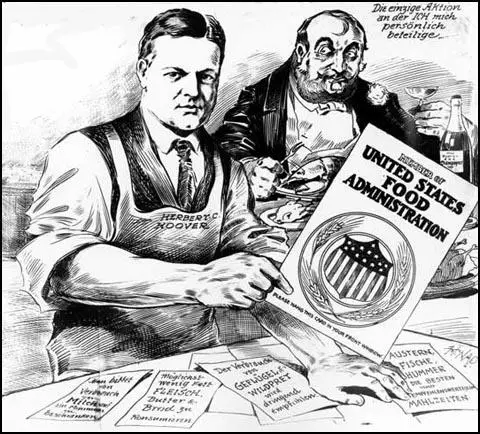
One senator protested that Wilson had given Hoover "a power such as no Caesar ever employed over a conquered province in the bloodiest days of Rome's bloody despotism". Hoover replied that, "Winning a war requires a dictatorship of some kind or another. A democracy must submerge itself temporarily in the hands of an able man or an able group of men. No other way has ever been found." (12)
Hoover's main objectives was to persuade farmers to grow more and grocery shoppers to buy less so that surplus food should be sent to America's overseas allies. Hoover established set days for people to avoid eating specified foods and save them for soldiers' rations. For example, people were told not to eat meat on Mondays. In January, 1918, Hoover announced "the law of supply and demand... had been suspended." (13)
As head of the Food Administration's Grain Corporation, Hoover informed millers that if they did not sell flour to the government at a price he determined, he would requisition it, and he told bakers they must make "victory bread or close." In another speech Hoover argued: "The law is not sacred... Its unchecked operation might even jeopardize our success in war... It is imperative... that economic thinkers denude themselves of their procrustean forumulas of supply and demand... for in a crisis... government must necessarily regulate the price, and all theories to the contrary go by the board." (14)
A network of 1,200 Price Interpreting Boards announced "fair prices" which were published in newspapers so that housewives might boycott any grocer or butcher who did not fall into line. "We need to put the stamp of shame on wasteful eating, dressing and display of jewelry." To enforce these rules Hoover relied on his "one police force - the American woman". He urged them to complain to the authorities if they discovered the owners of shops were trying to avoid government regulations. (15)
Herbert Hoover told Wilson that his measures had not only delivered over $1.4 billion worth of food to Europe but had prevented food riots in American cities that would have resulted in "blood in our gutters". He told the congressional committee that democracy had triumphed because of "its willingness to yield to dictatorship". Hoover was attacked by some people for allowing some companies to make great profits from the scheme he had introduced. (16)
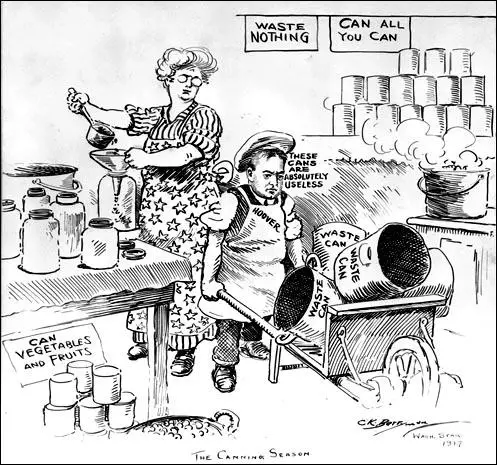
The Paris Peace Conference opened in January 1919. Hoover as director-general of Inter-Ally Supreme Council for Relief and Supply, also attended. President Woodrow Wilson argued strongly that it was vitally important to provide food for the German people in order to prevent a Bolshevik revolution. Hoover agreed and the decision to supply the Germans with 270,000 tons of food on 12th January. It has been claimed that Hoover was desperate to unload his "abundant stocks of low-grade pig products at high prices". (17)
Bernard Baruch, was on President's Wilson's staff and saw a lot of him during the conference, but the contact failed to foster a close mutual understanding. At a dinner party Baruch saw "Hoover, flanked by beautiful women, stared distractedly at his plate. Baruch, who was as loath to squander an opportunity to engage the opposite sex as the relief director was to waste food, afterward asked him how he could have ignored such charming companions. Hoover didn't seem to understand the question". (18)
David Lloyd George put in a claim for £25 billion of reparations at the rate of £1.2 billion a year. Georges Clemenceau wanted £44 billion, whereas Woodrow Wilson said that all Germany could afford was £6 billion. John Maynard Keynes, Lloyd George's economic adviser, disagreed with all these figures. He argued that Germany could only afford to pay £2 billion and if these higher figures were accepted it would ruin the economy of Europe. (19) Keynes found that Hoover was one of the few people at the conference who understood these economic arguments. Keynes wrote soon afterwards: "Mr. Hoover was the only man who emerged from the ordeal of Paris with an enhanced reputation." (20)
Secretary of Commerce
In 1920, both Democrats and Republicans considered asking Herbert Hoover to become their presidential candidate. It was suggested that Franklin D. Roosevelt could be Hoover's running-mate. Roosevelt agreed with the suggestion: "Hoover is certainly a wonder. I wish I could make him President of the United States. There could not be a better one." (21) Colonel Edward House agreed: "It's a wonderful idea. A Hoover-Roosevelt ticket is probably the only chance the Democrats have in November." (22)
On 6th March, 1920, Roosevelt and his wife, Eleanor Roosevelt, met Hoover to discuss the issue. Afterwards she wrote: "Mr. Hoover talked a great deal. He has an extraordinary knowledge and grasp of present-day problems." (23) At the end of March, Hoover broke his long silence and announced that he intended to be a candidate for the Republican nomination. However, he was defeated by Warren Harding. It was claimed that he "conducted a highly amateur campaign for the nomination; the politicians dismissed him with a sour laugh." (24)
The United States entered the 1920's in a strong economic position. The economies of her European rivals had been severely disrupted by the First World War and the United States had been able to capture markets which had previously been supplied by countries like Britain, France and Germany. Harding's isolationist foreign policy was popular with the electorate and in the 1920 Presidential Election he was voted into office by the widest popular margin in history. (25)
After the election Harding appointed Hoover as his Secretary of Commerce. Hoover demanded, and received, authority from Harding to coordinate economic affairs throughout the government. He created many sub-departments and committees, overseeing and regulating large areas of industry. In some cases he "seized" control of responsibilities from other Cabinet departments when he deemed that they were not carrying out their responsibilities well. As a result of this behaviour he became known as the "Secretary of Commerce and Under-Secretary of all other departments." (26)
During the campaign Warren Harding, promised to take measures to protect American farmers. It was thought that the rates under the Underwood-Simmons Tariff was too low. Joseph Fordney, the chair of the House Ways and Means Committee, and Porter McCumber, the chair of the Senate Finance Committee, introduced a bill which authorized the "Tariff Commission, working in an 'expert' and unpolitical way (and thus supposedly also independently of economic interests), to set rates so as to equalize the difference between American and foreign costs of production." (27)
In September 1922, the Fordney–McCumber Tariff Act was signed by President Harding. These raised tariffs to levels higher than any previously in American history in an attempt to bolster the post-war economy, protect new war industries, and aid farmers. "Duties on chinaware, pig iron, textiles, sugar, and rails were restored to the high levels of 1907 and increases ranging from 60 to 400 per cent were established on dyes, chemicals, silk and rayon textiles, and hardware." (28) Over the next eight years it raised the American ad valorem tariff rate to an average of about 38.5% for dutiable imports and an average of 14% overall. (29)
In the 1920s Herbert Hoover was associated with the successful growth in the American economy. This was partly due to the introduction of mass production. For example, between 1919 and 1929 output per worker increased by 43%. This increase enabled America to produce items that were cheaper than those manufactured by her European competitors. This enabled employers to pay higher wages. Hoover pointed out: "I think our people have long realized the advantages of large business operations in improving and cheapening the cost of manufacture and distribution…. The more goods produced, the more share there is to distribute." (30)
The United States also pioneered techniques in persuading people to buy the latest products. The development of commercial radio meant that companies could communicate information about their goods to a mass audience. In order to encourage people to purchase expensive goods like motor cars, refrigerators and washing machines, the system of hire-purchase was introduced which allowed customers to pay for these goods by installments.
President Warren Harding died suddenly on 2nd August, 1923, in San Francisco, and was replaced by his vice-president, Calvin Coolidge. The following year, Coolidge easily won the 1924 Presidential Election with 54% of the vote. Hoover remained Secretary of Commerce and the economy continued to grow and so did the industrial wage. This enabled the workers to buy the goods they were making. For example, by 1926 the average daily wage of a Ford worker was $10 and the Model T sold for only $350. (31)
Andre Siegfried, a French visitor pointed out: "In America the daily life of the majority is conceived on a scale that is reserved for the privileged classes anywhere else... The use of the telephone, for instance, is very widespread. In 1925 there were 15 subscribers for every 100 inhabitants as compared with 2 in Europe, and some 49,000,000 conversations per day.... Wireless is rapidly winning a similar position for itself, for even in 1924 the farmers alone possessed over 550,000 radios.... Statistics for 1925 show that... the United States owned 81 per cent of all the automobiles in existence, or one for every 5.6 people, as compared with one for every 49 and 54 in Great Britain and France." (32)
The real wages of industrial workers increased by about 10 per cent in the 1920s. However, productivity rose by more than 40%. Semi-skilled and unskilled workers in mass production, who were not unionized, lagged far behind skilled craftsmen and therefore was a growth in inequality: "The average industrial wage rose from 1919's $1,158 to $1,304 in 1927, a solid if unspectacular gain, during a period of mainly stable prices... The twenties brought an average increase in income of about 35%. But the biggest gain went to the people earning more than $3,000 a year.... The number of millionaires had risen from 7,000 in 1914 to about 35,000 in 1928." (33)
The farming community had not enjoyed the benefits of this growing economy. The Fordney–McCumber Tariff Act caused serious problems for the farmers. Senator David Walsh pointed out that farmers were net exporters and so did not need protection from tariffs. He explained that American farmers depended on foreign markets to sell their surplus. The price of farming machinery also increased. For example, the average cost of a harness rose from $46 in 1918 to $75 in 1926, the 14-inch plow rose from $14 to $28, mowing machines rose from $45 to $95, and farm wagons rose from $85 to $150. Statistics of the Bureau of Research of the American Farm Bureau that showed farmers had lost more than $300 million annually as a result of the tariff. (34)
As Patrick Renshaw has pointed out: "The real problem was that in both agricultural and industrial sectors of the economy America's capacity to produce was tending to outstrip its capacity to consume. This gap had been partly bridged by private debt, easy credit, easy credit and hire purchase. But this would collapse if anything went wrong in another part of the system." (35)
1928 Presidential Election
President Calvin Coolidge announced in August 1927 that he would not seek a second full term of office. Coolidge was unwilling to nominate Hoover as his successor. The two men had a poor relationship on one occasion he remarked that "for six years that man has given me unsolicited advice - all of it bad. I was particularly offended by his comment to 'shit or get off the pot'." (36)
Coolidge was not alone in thinking that Hoover might be a bad candidate. Republican leaders cast about for an alternative candidate such as Treasury Secretary Andrew Mellon and the former Secretary of State Charles Evans Hughes, Despite these reservations, Hoover won the presidential nomination on the first ballot of the convention. Senator Charles Curtis of Kansas was selected as his running-mate. One newspaper reported: "Hoover brings character and promise to the Republican ticket. He is a new kind of candidate in a day surfeited with old forms and old habits in politics." (37)
Senator George H. Moses, chairman of the Republican national convention, sent a letter congratulating Herbert Hoover on his nomination. He replied: "You convey too great a compliment when you say that I have earned the right to the presidential nomination. No man can establish such an obligation upon any part of the American people. My country owes me no debt. It gave me, as it gives every boy and girl, a chance. It gave me schooling, independence of action, opportunity for service and honor. In no other land could a boy from a country village, without inheritance or influential friends, look forward with unbounded hope. My whole life has taught me what America means. I am indebted to my country beyond any human power to repay." (38)
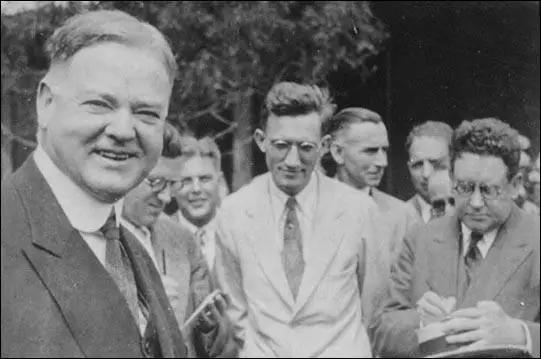
One of the main issues in the election campaign was the taxes imposed on imports. The Fordney-McCumber Act of 1922 raised American tariffs on many imported goods to protect factories and farms. The tariff rate was an average of about 38.5% for dutiable imports and an average of 14% overall. However, in response to this, most of American trading partners had raised their own tariffs to counter-act this measure. (39)
Industrialists such as Henry Ford attacked the tariff and argued that the American automobile industry did not need protection since it dominated the domestic market and its main objective was to expand foreign sales. He pointed out that France raised its tariffs on automobiles from 45% to 100% in response to the Fordney-McCumber Act. Ford and other industrialists tended to favour the idea of free trade. (40)
David Walsh, a member of the Democratic Party, challenged the tariff by arguing that the farmers were net exporters and so did not need protection; they depended on foreign markets to sell their surplus. Hoover and the Republicans still believed in tariffs. William Borah, the charismatic senator from Idaho, widely regarded as a true champion of the American farmer, had a meeting with Hoover and offered to give him his full support if he promised to increase tariffs of agricultural products if elected. (41) Nearly a quarter of the American labour force was then employed on the land and Hoover wanted their vote. He therefore agreed with the proposal and during the campaign promised the American electorate that he would revise the tariff. (42)
The Democratic candidate was Al Smith. As governor of New York he attempted to bring an end to child labour, improve factory laws, housing and the care of the mentally ill. During his campaign Smith gave his support for an increase to the tariffs for imported goods, even though most of the party leaders, including Cordell Hull, John J. Raskob, Burton K. Wheeler and Harry F. Byrd, were strong opponents of the Fordney-McCumber Act. (43)
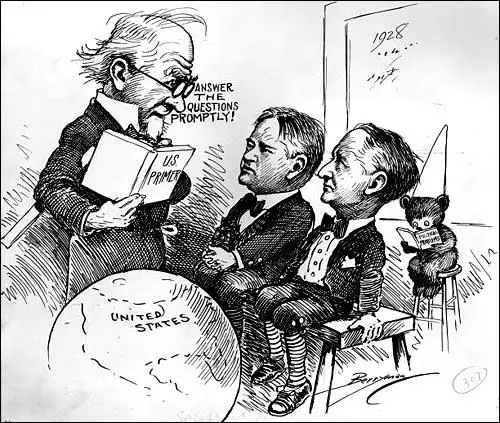
Smith was the first Roman Catholic to be a serious candidate for the presidency. This became a serious problem in the Deep South and the Ku Klux Klan burned Smith's effigy and Catholics were vilified for letting blacks worship in the same churches as whites. In the 1928 Presidential Election several states that had previously voted Democrat, such as Texas, Florida, Tennessee, Kentucky and Virginia voted Republican. Smith won 40.8% of the vote compared to Hoover's 58.2%. (44)
Carter Field argued that the business community was pleased with the election of Hoover: "In the months following the election of Hoover, in 1928, there was a wild stock-market boom. Most speculators, most businessmen, most people thought the country was moving on to a new high plateau of prosperity. Hoover was the miracle man. He knew about business and would help it prosper. Stocks were already high the day Hoover was elected; for example, American Telephone, which was sold around 150 in the spring of 1927 and was about 200 on election day, 1928, soared to a high above 310." (45)
After his election Hoover asked Congress for an increase of tariff rates for agricultural goods and a decrease of rates for industrial goods. Reed Smoot from Utah and chairman of the Senate Finance Committee and Willis C. Hawley, from Oregon, the chairman of the House Ways and Means Committee, agreed to sponsor the proposed bill. In the House of Representatives the president's bill was completely changed and now included rate hikes covering 887 specific products. (46) Smoot and Hawley argued that raising the tariff on imports would alleviate the over-production problem. In May 1929, the House of Representatives passed the Smoot–Hawley Tariff bill on a vote of 264 to 147, with 244 Republicans and 20 Democrats voting in favor of the bill. (47)
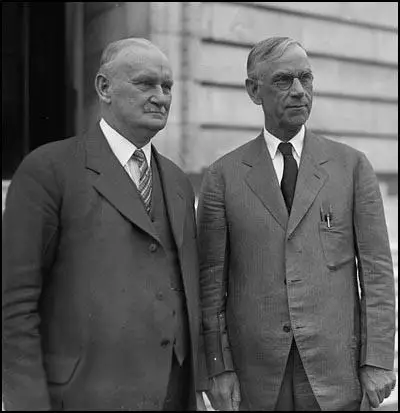
The Smoot–Hawley Tariff bill was then debated in the Senate. It came under attack from Democrats. Reed Smoot defended the bill by arguing: "This government should have no apology to make for reserving America for Americans. That has been our traditional policy. ever since the United States became a nation. We have returned to participate in the political intrigues of Europe, and we will not compromise the independence of this country for the privilege of serving as schoolmaster for the world. In economics as in politics, the policy of the government is, 'America First'. The Republican Party will not stand by and see economic experimenters fritter away our national heritage." (48)
Franklin D. Roosevelt
Franklin Delano Roosevelt, the son of James Roosevelt and his second wife, Sara Delano Roosevelt, was born Hyde Park, on 30th January, 1882. Both sides of the family were extremely wealthy. The Roosevelts were one of the oldest families in America and had made their fortune from land and trading in the 18th century and increased their wealth during the 19th century by investing in iron and coal mines. (49)
Since arriving in America from Holland in 1624 the Roosevelts had been active in politics. Franklin later wrote: "Some of the famous Dutch families in New York today have nothing left but their name - they are few in numbers, they lack progressivism and a true democratic spirit. One reason - perhaps the chief - of the virility of the Roosevelts is their very democratic spirit... They have felt that there was no excuse for them if they did not do their duty by the community." (50)
At the time of his birth the United States was becoming the world's most powerful country. It's gross domestic product (GDP) had doubled since 1865 and was now the largest in the world; one third larger than Britain's, twice that of France, and three times as great as Germany. (51) "The production of steel, less than twenty thousand tons in 1867, totaled almost 2 million tons in 1882, Coal production had tripled. On the negative side, more than five hundred miners lost their lives in deep-pit accidents each year." (52)
Families as wealthy as the Roosevelts usually entrusted newborn babies to the care of experienced nurses. As soon as she recovered from childbirth, Sara insisted on doing everything herself: "Every mother ought to learn to care for her own baby, whether she can afford to delegate the task to someone or not." She kept to a tight deadline: "Awake at seven. Breakfast at eight. Lessons until eleven. Lunch at noon. More lessons until four. Two hours of play followed by supper at six and bed by eight." (53)
The Roosevelts were supporters of the Democratic Party and in 1884 Presidential Election they helped fund the campaign of Grover Cleveland. After the election James agreed to a diplomatic post in Vienna. Before leaving Washington, James and five-year-old Franklin called on the president to discuss the appointment. As they were leaving Cleveland told Franklin: "My little man, I am making a strange wish for you. It is that you may never be president of the United States." (54)
James Roosevelt, aged 54 at his son's birth, was content to leave the disciplining to his wife. "Franklin never knew what it meant to have the kind of respect for his father that is composed of equal parts of awe and fear. The regard in which he held him, amounting to worship, grew out of a companionship that was based on his ability to see things eye to eye, and his father's never-failing understanding of the little problems that seem so grave to a child." (55)
Sara Roosevelt employed several tutors to teach Franklin mathematics, history, Latin, French and German. His most important teacher was a young Swiss woman named Jeanne Rosat-Sandoz, who not only taught him modern languages but attempted to instill a sense of social responsibility. He later wrote to her, "I have often thought that it was you, more than anyone else, who laid the foundation for my education." (56)
Franklin Roosevelt did not have any brothers or sisters and so until he was sent away to boarding school he spent most of his time in the company of adults. Sara tried to teach him to think like an adult and was very careful about the books she selected for him to read: "The highest ideal I could hold up before our boy was to grow to be like his father: straight and honorable, just and kind." (57) One family member commented that "seldom has a young child been more constantly attended and incessantly approved of by his mother." (58)
The family spent a lot of time travelling in Europe. The first school he attended was in Bad Nauheim. Sara insisted that nine-year-old Franklin be enrolled in the local school to improve his German. His schoolmaster, Christian Bommersheim, later commented: "His parents put him in my class and he impressed me very quickly as an unusually bright young fellow. He had such an engaging manner, and he was always so polite that he was soon one of the most popular children in the school." (59)
At the age of fourteen Roosevelt was sent to America's most exclusive private school, Groton, in Massachusetts. The founder and headmaster of the school was the Reverend Endicott Peabody, who had studied for the ministry at the Episcopal Theological Seminary at Cambridge. Tuition was $500 a year. That was about twice what the average American family had to live on. Life at the school was Spartan. Each boy lived in a six-by-ten-foot cubicle with a bed, bureau, rug and chair. There was a curtain instead of a door because Peabody was opposed to too much privacy. The boys were also forced to have two cold showers a day. Averell Harriman, one of the boys at Gorton, told his father, that Peabody "would be an awful bully if he weren't such a terrible Christian." (60)
Franklin Roosevelt was not an outstanding student: "He read rapidly and retained facts easily, a trait that would become more pronounced in the years ahead. He was fluent in French and German and already possessed an uncanny ability to assimilate what he observed. But Roosevelt was not a reflective thinker, nor an original thinker. He learned by doing. And the extensive traveling he did with his parents - he went to Europe eight times in his first fourteen years - exposed him to a wider range of experience than most boys his age." (61)
Roosevelt entered Harvard University in the autumn of 1900, along with sixteen of his eighteen Groton classmates. He rented a three-room suite in Westmorley Court, with his close friend Lathrop Brown. He studied economics, government, and history. Roosevelt had little difficulty academically. Later he recalled: "I took economics courses in college for four years and everything I was taught was wrong." (62)
Franklin's father, James Roosevelt, had a severe heart-attack on 8th December, 1900. He died a few hours later. Franklin was provided with a trust fund and for the rest of his life never had to worry about money. His father left an estate of $600,000 (around $14 million in today's currency). Two years previously, his mother, Sara Delano Roosevelt, had inherited $1.3 million from her father ($28 million). (63)
Eleanor Roosevelt
While at university he met became engaged to his cousin, Eleanor Roosevelt. Her father, Elliott Roosevelt, was the brother of Theodore Roosevelt, the president of the United States. Her life had been very difficult. Her mother, Anna Hall Roosevelt, died of diphtheria at the age 29. Her father was an alcoholic, who had committed suicide in August, 1894, and so by the age of ten she was an orphan. (64)
Eleanor's autobiographical writings depict a lovable, caring father and an austere, self-absorbed mother. Her biographer, Blanche Wiesen Cook, has pointed out: "She (Eleanor) did not relate to her mother's bitter situation, even in adulthood, after she knew the facts. And she never acknowledged the sacrifice her mother had made for her, an act of love that allowed Eleanor to maintain her romantic image of her father." (65)
At the age of 15 Eleanor was sent to a boarding school in London. The headmistress of the school was Marie Souvestre, the daughter of the French philosopher and novelist, Émile Souvestre. A committed feminist, she believed passionately in educating women to think for themselves, to challenge accepted wisdom, and to assert themselves. Souvestre wrote to Eleanor's guardian: "She is the most amiable girl I have ever met; she is nice to everybody, very eager to learn and highly interested in her work." (66)
Eleanor was very upset when she had to leave the school at 18: "Mlle. Souvestre had become one of the people whom I cared most for in the world, and the thought of the long separation seemed hard to bear... When I left I felt quite sure that I would return before long, but I realize now that Mlle. Souvestre, knowing her infirmities, had little hope of seeing me again. She wrote me lovely letters, which I still cherish. They show the kind of relationship that had grown up between us and give an idea of the fine person who exerted the greatest influence, after my father, on this period of my life." (67)
Roosevelt was a member of the Democratic Party but in the 1904 Presidential Election he voted for his uncle, Theodore Roosevelt. "My father and grandfather were Democrats and I was born and brought up as a Democrat. But in 1904, when I cast my first vote for president, I voted for the Republican candidate, Theodore Roosevelt, because I thought he was a better Democrat than the Democratic candidates. If I had to do it all over again, I would not alter that vote." (68)
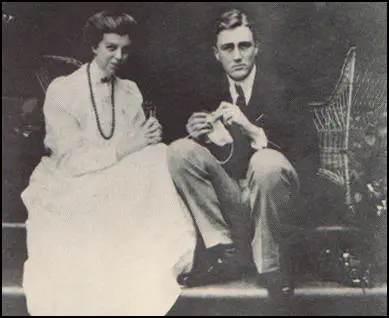
Franklin and Eleanor Roosevelt were married on 17th March, 1905. President Roosevelt attended the wedding. When he accepted the invitation he wrote to Franklin about the importance of love: "I am as fond of Eleanor as if she were my daughter; and I like you, and trust you, and believe in you. No other success in life - not the Presidency, or anything else - begins to compare with the joy and happiness that come in and from the love of a true man and the true woman, the love which never sinks lower and sweetheart in man and wife." (69)
New York State Senate
Franklin Roosevelt attended Columbia Law School. A fellow student, William Donovan described him as a person with enormous self-confidence but with little desire to spend much time studying. His final grades were three Bs, three Cs, and a D, which placed him roughly in the middle of the class. One of his tutors, Professor Jackson E. Reynolds, commented that Roosevelt had little aptitude for the law and "make no effort to overcome that handicap by hard work." (70)
In 1906 Roosevelt passed his New York state bar exam and joined Carter, Ledyard and Milburn at 54 Wall Street, a bluechip firm whose best clients, big corporations like Standard Oil of Ohio and American Tobacco, who were the very people who were vigorously fighting President Theodore Roosevelt's anti-trust suits in federal court. However, Franklin was too junior to become involved in this work. (71)
Roosevelt wanted a career in politics and in 1910 the Democratic Party in New York asked him to run for election to the state senate for rural Columbia, Duchess and Putnam counties. Frances Perkins was one of the people who helped him in his campaign: "Tall and slender, very active and alert, moving around the floor, going in and out of committee rooms, rarely talking with the members, not particularly charming (that came later), rarely smiling, with an unfortunate habit - so natural he was unaware of it - of throwing his head up. This, combined with his pince-nez (a pair of eyeglasses with a nose clip instead of earpieces) and great height, gave him the appearance of looking down his nose at most people." (72)
Roosevelt became one of the first politicians to campaign in an automobile. It was a risky strategy as cars were luxury items at the time and it highlighted his wealthy background. However, travelling at the speed of twenty miles an hour, Roosevelt was able to criss-cross the district as no candidate had done before. The car draped in the national flag soon caught people's attention and his speeches attracted large crowds: "They came to see as well as hear the handsomest candidate that ever asked for votes in their district. Franklin was so good looking he might have stepped out of a magazine cover." (73)
Roosevelt carried more than two thirds of the precincts in the Senatorial District, defeating the Republican candidate 15,708 to 14,568, an unprecedented Democratic majority. At the age of 28 Roosevelt had achieved his first political success. His mother, Sara Delano Roosevelt, commented: "I have always thought Franklin perfectly extraordinary, and, as I look back, I don't think he has ever disappointed me." (74)
Gifford Pinchot was a family friend who was the most important conservationist in the United States. Roosevelt arranged for Pinchot to give lectures on the subject in New York. He was also a supporter of votes for women after he had a meeting with Inez Milholland, one of the leaders of the National Women's Party. His wife, Eleanor Roosevelt, claimed she was shocked by this conversion: "I was shocked, as I had never given the question serious thought, for I took it for granted that men were superior creatures and knew more about politics than women did, and I realised that if my husband was a suffragist I probably must be, too." (75)
In the 1912 election Roosevelt appointed Louis Howe as his campaign manager. Howe was a journalist who had made his name when helping Thomas Mott Osborne, to defeat the press baron, William Randolph Hearst, who was trying to become the Democratic Party presidential candidate. Hearst, who owned 28 newspapers and magazines, was a difficult man to beat. Howe biographer Julie M. Fenster describes the anti-Hearst campaign as a "personal turning point" for Howe, in which he got his first taste of politics, learned the practical mechanics of party organization, and had an opportunity to make news rather than simply reporting it. (76)
Howe was greatly impressed with Roosevelt and came to the conclusion that "nothing but an accident could keep him from becoming president". (77) Making sure he did did so became the purpose of Howe's life. As his secretary explained, "Louis was small, ugly and insignificant looking. Roosevelt was big, handsome and dramatic. Louis Howe closed one eye and saw the two divergent personalities merge into a political entity and the picture fascinated him." (78) Howe's strategy was to send personal letters to voters and this was highly successful and he had an easy victory in November 1912. (79)
According to Eleanor Roosevelt, Howe's most important contribution to her husband's political outlook was to persuade him to become concerned with the plight of the American work-force. He arranged for him to meet with trade union leaders. Howe insisted Roosevelt attend hearings on labour problems in person rather than delegate labour relations to someone else. (80)
Assistant Secretary of the Navy
On 13th January, 1913, President Woodrow Wilson invited Roosevelt to Washington. He was introduced to Josephus Daniels, the new Secretary of the Navy. Daniels asked Roosevelt: "How would you like to be assistant secretary of the Navy?" Roosevelt replied: "It would please me better than anything in the world. All my life I have loved ships and have been a student of the Navy, and the assistant secretaryship is the one place, above all others, that I would like to hold... nothing would please me so much as to be with you in the Navy." (81)
Daniels told Elihu Root about his appointment. He replied: "You know the Roosevelts, don't you? Whenever a Roosevelt rides, he wishes to ride in front... though, of course, being a Republican, I have no right to make any suggestion." Daniels replied that he wasn't worried about Roosevelt and that he wanted a strong man as assistant secretary. "A chief who fears that an assistant will outrank him is not fit to be chief." (82)
Roosevelt had a good opinion of President Wilson. He told Frances Perkins: "You know, Wilson had an uncanny understanding of the European problem. He understood the moral drives of modern man. He was a Presbyterian, you know, and a tough one, and he was perfectly sure that all men are sinful by nature. He figured it out that Western civilisation would attempt to destroy itself through the natural sinful activities of modern man unless by the grace of God the decent people of Western civilisation resolved to support the doctrine of the Golden Rule." (83)
Daniels and his close friend, William Jennings Bryan, were the two most radical members of Wilson's cabinet. "For seventeen years they had worked to free the common man from the clutches of trusts, railroads, robber barons, and whatever other vested interest appeared on the horizon. Daniels served as Bryan's publicity director in each of his presidential campaigns, and the two shared a contempt for anything that smacked of wealth and special privilege." (84)
Louis Howe moved to Washington to be with Roosevelt and was appointed as his secretary on $2,000 a year. "My husband had asked Louis Howe to come down as his assistant in the Navy Department; Louis moved his wife and two children, one of them a fairly well-grown girl and the other a baby boy, into an apartment not far from us." (85) Every morning at 8.15 Howe would call for Roosevelt and the two men would walk to the Navy Department. Elliott Roosevelt fondly remembers his father "striding down Connecticut Avenue with Louis hurrying along at his side. The two of them looked uncannily like Don Quixote and Sancho setting out to battle with giants." (86)
Howe's duties involved labour relations, special investigations and speech writing. He also took charge of patronage, handled Roosevelt's correspondence, made appointments for his boss. Daniels soon became aware of Howe's importance: "Howe advised FDR about everything. His one and only ambition was to steer Franklin's course so that he could take the tide at the full. He was totally devoted. He would have sidetracked both President Wilson and me to get Franklin Roosevelt to the White House." (87)
Roosevelt read The Influence of Sea Power Upon History 1660-1783, a book published by Alfred Thayer Mahan in 1890. Mahan argued that national greatness was closely associated with the sea, with its commercial use in peace and its control in war. Roosevelt shared Mahan's belief that the example of Britain showed the command of the world's oceans was key to world power. Roosevelt became an ardent proponent of a "Big Navy". (88)
As assistant secretary of the Navy, Roosevelt's impact on the policies of the Wilson's administration was minimal. However, his eight years in Washington provided the opportunity to learn about the realities of national politics. Howe taught Roosevelt how to deal with organized labour. On several occasions he had meetings with trade union leaders. His great strength was that he was a good listener. He told them: "I want you to feel that you can come to me at any time in my office and we can talk matters over. Let's get together for I need you to teach me your business and show me what's going on." (89)
Lucy Mercer
Eleanor Roosevelt gave birth to their sixth child, John Aspinwall Roosevelt, on 13th March, 1916. According to one of his biographers, Jean Edward Smith, after the birth of their last child "the evidence suggests that Eleanor and Franklin adopted abstinence as the only sure means of birth control". (90) They were both members of the Episcopal Church that at that time forbade birth control, and it was illegal in many states by statute. Eleanor told her daughter that "sex is an ordeal to be borne" and that after John's birth "that was the end of any marital relationship". (91)
In the summer of 1916 Franklin Roosevelt began a relationship with Lucy Mercer, Eleanor's part-time social secretary. She was 25 and Franklin was 34. Lucy was the impoverished daughter of high-living socialites who had recklessly spent their way through a substantial fortune. Lucy was well-liked by Roosevelt's children: "She was femininely gentle where Mother had something of a schoolmarm's air about her, outgoing where Mother was an introvert. We children welcomed the days she came to work." (92)
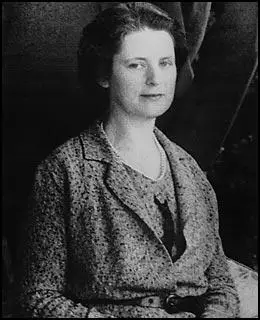
Franklin Roosevelt was said to be at his peak of physical attractiveness. Arthur C. Murray, who was based in Washington at this time described him as "breathing health and vitality". (93) Another official commented that "he was the most magnetic young men I ever saw." (94) Admiral Sheffield Cowles warned him about the dangers of the attention he was receiving from young women. (95)
Elliott Roosevelt was aware of the relationship and later explained why his father was attracted to Lucy. She had "the same brand of charm as Father, and there was a hint of fire in her warm dark eyes... in the new circumstances of Father's life at home, I see it as inevitable that they were irresistibly attracted to each other." (96) Alice Roosevelt Longworth, the eldest daughter of Theodore Roosevelt, provided a safe house for the couple to meet. She later recalled: "Franklin deserved a good time. He was married to Eleanor." (97)
By the time the United States had entered the First World War in 1917, Roosevelt had the country's naval plants and yards working efficiently. During the war he helped to devise the plans for the battle of the North Sea which broke the effectiveness of German U-boat warfare. On 24th June, 1917, Roosevelt arranged for Lucy Mercer to work as his secretary in Washington. The war and his relationship with Lucy meant that he rarely arrived home until after midnight. (98)
Josephus Daniels, the new Secretary of the Navy, discovered about the affair. He was old-fashioned in his views about the sanctity of marriage and the sin of divorce, and on 5th October, 1917, he ordered her to be sacked. Blanche Wiesen Cook, also believes that it is possible that Eleanor was also aware of the relationship. Members of the family knew, so did many of Eleanor's Red Cross co-workers, and so did "almost everybody else of importance in Washington." (99)
Further evidence that Eleanor might have suspected something is that all of a sudden she became very close to Sara Delano Roosevelt. The relationship between Eleanor and her mother-in-law had never been easy. However, in 1918 she wrote to her virtually every day. In one letter she said: "As the years go on, I realize how lucky we are to have you, and I wish we could always be together. Very few mothers I know mean as much to their daughters as you do to me." (100) On 17th March she wrote: "As I have grown older I have realized better all you do for us and all you mean to me and the children especially and you will never know how grateful I am nor how much I love you." (101)
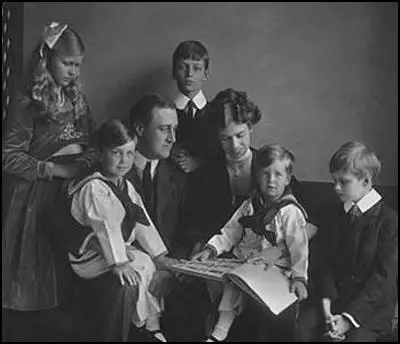
In the summer of 1918 Franklin Roosevelt visited the Western Front in France before meeting George Clemenceau. "He is only 77 years old and people say he is getting younger everyday... The wonderful old man leaves his office almost every Saturday in a high-powered car, dashes to the front, visits a Corps Commander, travels perhaps all night, goes up a good deal closer in the actual battle line than the officers like, keep it up all day Sunday and motors back in time to be at his desk on Monday morning." He then had meetings with David Lloyd George, the British prime minister, who he described as "not very tall, rather large head, rather long hair, but tremendous vitality." (102)
On his return, in the course of unpacking Franklin's luggage, Eleanor discovered a pack of love letters from Lucy Mercer. Eleanor later told Joseph P. Lash: "The bottom dropped out of my world. I faced myself, my surroundings, my world, honestly for the first time." (103) Eleanor apparently told Franklin that she was willing to give him a divorce. However, Sara was furious and threatened to cut him out of his will if he left his wife. (104)
Louis Howe pointed out that Josephus Daniels, the Secretary of the Navy, would certainly sack him if he left Eleanor. He also told him that as a divorced man he could never become president. Howe also had a meeting with Eleanor and persuaded her that FDR could not go on without her. She claimed that she would only be willing to continue with the marriage if FDR promised never to see Lucy Mercer again. FDR agreed to this deal and not long afterwards Lucy married the 58 year-old wealthy playboy, Winthrop Rutherfurd. (105)
1920 Presidential Election
Franklin Roosevelt attended the Paris Peace Conference with President Woodrow Wilson. He spoke French fluently and this helped greatly in the negotiations. but was highly critical of the terms of Versailles Treaty. He believed the "the effort to make the world safe for democracy had resulted in making the world safe for the old empires". Roosevelt also had doubts about the formation of the League of Nations. (106)
At the Democratic convention in San Francisco, Roosevelt gave his support to Al Smith: "I love him as a friend; I look up to him as a man; I am with him as a Democrat; and we all know his record throughout the nation as a great servant of the public." (107) However, the nomination went to three-term Ohio governor, James Middleton Cox. In the negotiations that took place with party managers, Cox them: "My choice is young Roosevelt. His name is good, he's right geographically, and he's anti-Tammany." (108)
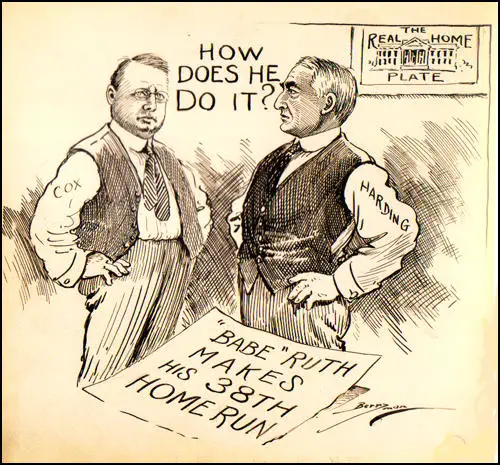
The 1920 campaign saw Eleanor Roosevelt emerge into public life. It was Louis Howe who recognised her potential and asked her advice. "I was flattered and before long I found myself discussing a wide range of topics." (109) Eleanor developed a close relationship with Howe and according to Blanche Wiesen Cook: "Louis Howe was the first of many intimate friends that ER grew to trust and love, with a warmth and generosity both spontaneous and unlimited". (110)
The United States entered the 1920's in a strong economic position. The economies of her European rivals had been severely disrupted by the First World War and the United States had been able to capture markets which had previously been supplied by countries like Britain, France and Germany. Roosevelt knew that the Democrats had no chance of winning. The Republican isolationist foreign policy was popular with the electorate and in the 1920 Presidential Election Harding was voted into office by the widest popular margin in history. (111)
Poliomyelitis
On 10th August, 1921, Franklin Roosevelt took a swim in Lake Glen Severn, a shallow freshwater pond on Campobello Island. About an hour later Roosevelt felt a sudden chill. He went straight to bed but continued to tremble despite two heavy blankets. The next morning he was worse. When he attempted to stand his left leg buckled beneath him. That evening he had lost the power to move his legs. He ached all over and was paralyzed from the chest down. However, it was not until fifteen years later before he was diagnosed as suffering from poliomyelitis. (112)
At first it was hoped that it was a mild attack but by October it was clear that he had lost the ability to walk. Sara Roosevelt wanted her son to retire from public life. Eleanor Roosevelt and Louis Howe disagreed and thought that the prospect of returning to politics would aid his recovery. Eleanor later recalled: "This was the most trying winter of my entire life. My mother-in-law thought we were tiring my husband and that he should be kept completely quiet. This made the discussions about his care somewhat acrimonious on occasion." (113).
Although he was confined to bed, with the help of Eleanor, Louis and his new secretary, Marguerite LeHand, he was able to keep up a constant correspondence with Democratic Party leaders. In March, 1922, he was fitted with steel braces that weighted fourteen pounds and ran from his heels to above his hips. Since his hips were paralyzed, he was incapable of moving his legs individually and was taught to pivot forward on his crutches, using his head and upper body for leverage. His doctor told him that he would never be able to walk normally. (114)
Eleanor agreed to become involved in politics to keep the Roosevelt name in the news. By this stage Eleanor was politically far to the left of her husband. She became involved in the campaigns against child labour and racial discrimination and became a supporter of organisations such as National Consumer's League, League of Women's Voters, National Association for the Advancement of Coloured People (NAACP) and the Women's Trade Union League. People she worked with during this period included Frances Perkins, Jane Addams, Rose Schneiderman, Nancy Cook and Marion Dickerman. Eleanor became the "centre of a dynamic group of women reformers who were college-educated, who had worked helping the urban poor in settlement houses and were social feminists." (115)
Sara Roosevelt also became involved in these progressive campaigns. Mary McLeod Bethune, the president of the National Association of Colored Women, remembers attending a luncheon for thirty-five board members of the National Council for Women. "Mrs. James Roosevelt did a remarkable thing. Very deliberately, she took my arm and seated me to the right of Eleanor Roosevelt, the guest of honor! I can remember too, how the faces of the Negro servants lit up with pride. From that moment on, my heart went out to Mrs James Roosevelt. I visited her at her home many times subsequently, and our friendship became one of the most treasured of my life." (116)
Franklin Roosevelt returned to public life in 1924 when he agreed to help Al Smith in his attempt to become president. According to Eleanor: "He was entirely well and lived a normal life, restricted only by his inability to walk. On the whole, his general physical condition improved year by year, until he was stronger in some ways than before his illness... In the spring of 1924, before the National Democratic Convention met in New York, Al Smith, who was a candidate for the presidential nomination, asked him to manage his preconvention campaign. This was the first time that my husband was to be in the public eye since his illness. A thousand and one little arrangements had to be made and Louis carefully planned each step of the way." (117)
Frances Perkins believed that this illness changed Roosevelt's personality and in doing so, made him into a better man. "Roosevelt underwent a spiritual transformation during the years of his illness. I noticed when he came back that the years of pain and suffering had purged the slightly arrogant attitude he had displayed on occasion before he was stricken. The man emerged completely warmhearted, with humility of spirit and with a deeper philosophy. Having been to the depths of trouble, he understood the problems of people in trouble." (118)
Governor of New York
In 1928 Franklin D. Roosevelt accepted the nomination as the Democratic candidate for the Governor of New York. Some newspapers questioned the decision. The New York Post asserted: "There is something both pathetic and pitiless in the drafting of Franklin D. Roosevelt". (119) The New York Herald Tribune took a similar view: "The nomination is unfair to Mr. Roosevelt. It is equally unfair to the people of the state." (120) Al Smith responded by arguing: "A governor doesn't have to be an acrobat. The work of the governorship is brainwork. Frank Roosevelt is mentally as good as he ever was in his life." (121)
After being nominated Roosevelt had four weeks of energetic campaigning, sometimes speaking as often as fourteen times a day. "Roosevelt surprised all his friends, and I think himself, by the vigor and drive he, just out of the sickroom, put into the whirlwind visits to the hundreds of districts... He took to the automobile as a method of getting around and spoke from the back of it at outdoor meetings... He proved to himself and the people that he was not too sick to assume responsibility, as his opponents claimed. He had that imponderable human quality which made people feel they were close to him." (122)
Although the Democrats did badly that year, with Herbert Hoover being elected as president. However, Roosevelt, bucked the trend and obtained 2,130,238 votes against the 2,104,630 achieved by his Republican opponent, Albert Ottinger - a majority of 25,608 out of more than 4 million cast. The New York Times reported: It is too early to select the new leader of the Democratic Party or to predict nominations for a date so remote as 1932. Yet by a most extraordinary combination of qualities, political fortunes and diversified associations, Governor-elect Roosevelt is within reach of the elements of party leadership." (123)
Al Smith, the previous Governor of New York, urged Roosevelt to appoint two of his key advisers, to his administration, Robert Moses and Belle Moskowitz. Roosevelt, who wanted to show he was in control of the situation rejected these suggestions. He told one aide, "I've got to be governor of the State of New York and I've got to be it myself." Two years later Smith commented: "Do you know, by God, he has never consulted me about a damn thing since he became governor." (124)
Roosevelt appointed Frances Perkins as his industrial commissioner and a member of a governor's cabinet, the first woman to serve in that capacity. On her appointment he stated: "It is my firm belief that had women had an equal share in making laws in years past, the unspeakable conditions in crowded tenements, the neglect of the poor, the unwillingness to spend money for hospitals and sanitariums... would never have come about." (125) Other key figures in his administration included Edward J. Flynn (secretary of state), James Farley (chief strategist), Louis Howe (chief of staff), Henry Morgenthau (Agricultural Advisory Commission), Samuel Rosenman (speech writer) and Basil O'Connor (legal adviser). (126)
Unemployment which stood at 4 million in March 1930, reached 8 million in March 1931. Hoovervilles, settlements on tin shacks, abandoned cars and discarded packing crates, emerged on the edges of all big cities. President Hoover responded by urging Americans to embrace the principles of local responsibility and mutual self-help, by setting up community soup kitchens. If we depart from these principles, he argued, we will "have struck at the roots of self-government". (127)
Franklin Roosevelt made it clear that he disapproved of this approach to unemployment. He pointed out he was willing to spend $20 million to provide useful work where possible and, where such work could not be found, to provide the needy with food and shelter. "In broad terms I assert that modern society, acting through its government, owes the definite obligation to prevent the starvation or dire want of any of its fellow men and women who try to maintain themselves but cannot... To these unfortunate citizens aid must be extended by government - not as a matter of charity but as a matter of social duty." (128)
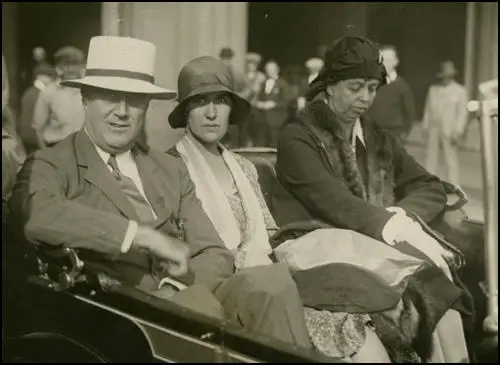
In addition to the $20 million relief package, Roosevelt asked the New York legislature, for funds to establish a new state agency, the Temporary Emergency Relief Administration (TERA), to distribute the funds. He also requested that the legislature to raise personal income taxes by 50% to pay for the relief effort. New York was the first state to establish a relief agency, and TERA immediately became a model for other states. THis included New Jersey, Rhode Island and Illinois. (129)
Roosevelt selected Jesse Straus, president of R. H. Macy department stores, and one of the most respected businessmen in New York, to head TERA. He chose as his executive director a forty-two-year-old social worker, Harry L. Hopkins, who at that time was unknown to Roosevelt or any of his advisers. Hopkins was an inspired choice. A gifted administrator who proved he could deliver aid swiftly. In the next six years TERA assisted some 5 million people - 40 per cent of the population of New York State. (130)
Eleanor Roosevelt pointed out that TERA was the first of her husband's important projects. "Many experiments that were later to be incorporated into a national program were being tried out in the state. It was part of Franklin's political philosophy that the great benefit to be derived from having forty-eight states was the possibility of experimenting on a small scale to see how a program worked before trying it out nationally." (131)
